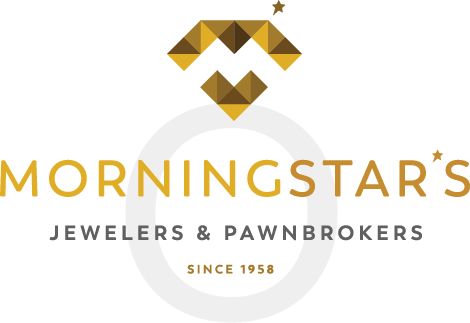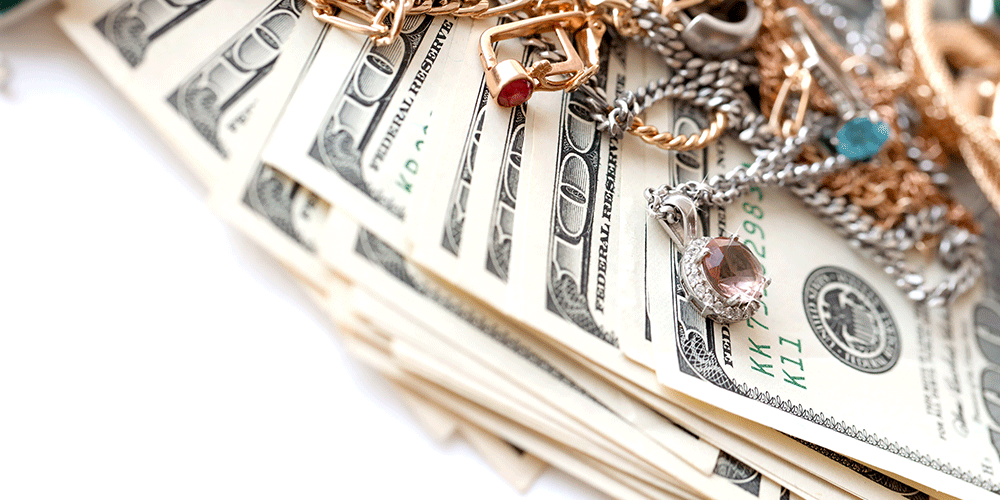¿Qué son los préstamos prendarios y cómo funcionan?
Comprar o pedir dinero prestado puede ser estresante, especialmente cuando necesitas efectivo rápido. Afortunadamente, los préstamos prendarios ofrecen una forma flexible y rápida de obtener dinero usando tus objetos de valor como garantía. Pero, ¿qué son exactamente los préstamos prendarios y cómo funcionan? En esta guía, explicaremos todo lo que necesitas saber sobre los préstamos prendarios — desde el proceso y las tasas de interés hasta qué artículos puedes empeñar y cómo se comparan con otros tipos de préstamos.
Introducción: ¿Qué es un Préstamo Prendario?
Un préstamo prendario es un préstamo a corto plazo respaldado por colateral proporcionado por una casa de empeño o prestamista. En lugar de basarse en su historial crediticio, los préstamos prendarios usan un artículo físico de valor — como joyas, electrónicos o relojes de lujo — como garantía. Usted entrega el artículo al prestamista, recibe un monto de préstamo basado en su valor y acuerda pagar el préstamo más intereses dentro de un plazo establecido.
Los préstamos prendarios son populares porque ofrecen acceso rápido a efectivo sin verificaciones de crédito, haciéndolos accesibles para personas que pueden no calificar para préstamos tradicionales. Entender cómo funcionan los préstamos prendarios y sus términos puede ayudarle a decidir si esta opción es adecuada para sus necesidades financieras.
Información Adicional: Los préstamos prendarios existen desde hace siglos, siendo una de las formas más antiguas de préstamos garantizados. Funcionan con el principio simple del colateral: el prestamista retiene su artículo hasta que el préstamo sea pagado. Debido a que su artículo respalda el préstamo, los prestamistas pueden aprobar préstamos rápidamente sin necesidad de verificación de crédito o papeleo extenso. Esto hace que los préstamos prendarios sean especialmente valiosos para personas que necesitan fondos inmediatos pero pueden tener acceso limitado a la banca tradicional.
¿Necesita Dinero Rápido? Hablemos de Préstamos Prendarios.
¿Tiene joyas que le gustaría usar como garantía para un préstamo a corto plazo? Estamos aquí para ayudar. Sin verificaciones de crédito—solo ofertas honestas y rápidas en efectivo.
Llame Ahora - 954-923-2372¿Cómo Funcionan los Préstamos Prendarios? Proceso Paso a Paso
Entender el proceso de préstamo prendario puede hacer que pedir prestado sea menos intimidante. Esto es lo que típicamente sucede:
1. Tasación y Valoración del Artículo
Cuando lleva un artículo a una casa de empeño, un tasador profesional evalúa su valor. La tasación considera factores como el estado, la marca, la demanda del mercado y el valor de reventa. Esto determina cuánto dinero puede pedir prestado.
Información Adicional: Los tasadores experimentados consideran las tendencias recientes de ventas y la demanda de artículos similares. Por ejemplo, un Rolex Submariner en excelente estado obtendrá un valor de préstamo más alto que un reloj genérico. El tasador también verificará la autenticidad para asegurar que el artículo sea genuino, ya que los artículos falsificados no pueden ser empeñados.
2. Determinación del Monto del Préstamo
El prestamista le ofrece un préstamo basado en un porcentaje del valor tasado del artículo, a menudo un porcentaje decente.
Información Adicional: La relación préstamo-valor (LTV) varía según el artículo y las políticas del prestamista. Los artículos de alta demanda con valores de reventa estables tienden a recibir LTVs más altos. Los prestamistas también consideran las posibles fluctuaciones del mercado y el riesgo asociado con la venta del colateral si el préstamo no se paga.
3. Acuerdo de Términos del Préstamo
Usted y el prestamista acuerdan los términos del préstamo, incluyendo la tasa de interés, el período de reembolso (usualmente de 30 a 90 días) y las tarifas. El prestamista emite un ticket de empeño detallando estos términos, que debe mantener seguro.
Información adicional: Este ticket de empeño es un documento legal que representa tu acuerdo de préstamo. Detalla tus derechos, el monto adeudado, fechas límite de pago y cualquier cargo adicional. Perder el ticket de empeño puede complicar la recuperación de tu artículo, por lo que es fundamental mantenerlo seguro.
4. Empeñando el artículo
Entregas el artículo a la casa de empeño como garantía mientras recibes el monto del préstamo en efectivo o cheque.
5. Pago o incumplimiento del préstamo
Para recuperar tu artículo, pagas el préstamo más cualquier interés y cargos antes de la fecha límite. Si no puedes pagar, el prestamista se queda con tu artículo y lo vende para recuperar el préstamo.
Información adicional: Algunas casas de empeño ofrecen extensiones o renovaciones si necesitas más tiempo. Sin embargo, estas generalmente implican cargos adicionales. El incumplimiento resulta en la pérdida de tu artículo, pero no hay más cobros de deuda ya que el préstamo estaba garantizado.
Usos comunes y beneficios de los préstamos prendarios
Los préstamos prendarios son ideales para personas que necesitan dinero rápido sin verificación de crédito. Aquí está el porqué:
- Acceso rápido al dinero: Los préstamos generalmente se aprueban al instante.
- Sin verificación de crédito: Tu puntaje de crédito no se ve afectado.
- Pago flexible: Algunas tiendas ofrecen renovaciones o extensiones.
- Garantizado por colateral: Los préstamos se basan en el valor del artículo, no en los ingresos.
Información adicional: Muchos prestatarios usan préstamos prendarios para cubrir gastos inesperados como facturas médicas, reparaciones de autos o emergencias cuando los préstamos tradicionales o tarjetas de crédito no son opciones viables. Debido a que los préstamos prendarios no requieren una consulta de crédito, son accesibles independientemente de tu historial financiero. Esto los convierte en un salvavidas para muchas personas que enfrentan desafíos financieros a corto plazo.
Comprendiendo las tasas de interés de los préstamos prendarios
Las tasas de interés en préstamos prendarios varían según el prestamista y las leyes locales, pero suelen ser más altas que los préstamos bancarios. Esto es lo que influye en las tasas:
- Tipo y valor del artículo: Los artículos más valiosos pueden tener tasas más bajas.
- Monto del préstamo: Los préstamos más grandes a veces pueden obtener mejores tasas.
- Límites legales: Muchos estados limitan cuánto interés puede cobrar una casa de empeño.
Información adicional: Debido a que los préstamos prendarios son a corto plazo y están garantizados solo por la garantía, las tasas de interés pueden ser un poco más altas para compensar el riesgo y los costos comerciales. Algunos estados tienen regulaciones que limitan estas tasas.
¿Qué artículos puedes usar para préstamos prendarios?
La mayoría de las casas de empeño aceptan una amplia gama de artículos valiosos, incluyendo:
- Joyería (oro, diamantes, relojes)
- Electrónicos (smartphones, laptops)
- Instrumentos musicales
- Herramientas eléctricas
- Coleccionables y antigüedades
En Morningstar’s, nos especializamos en relojes de lujo y joyería fina, ofreciendo tasaciones justas y montos de préstamo competitivos.
Información adicional: La condición y la demanda del mercado de su artículo afectan significativamente el valor del préstamo. Relojes más nuevos o piezas vintage raras pueden obtener préstamos más altos, mientras que estilos dañados o anticuados pueden ser menos valiosos. Siempre pregunte sobre los artículos aceptados antes de visitar una casa de empeño.
Préstamos prendarios vs otros tipos de préstamos
| Característica | Préstamos prendarios | Préstamos de día de pago | Préstamos personales |
|---|---|---|---|
| Verificación de crédito | No | Generalmente no | Sí |
| Garantía | Sí (artículo físico) | No | No |
| Monto del préstamo | Basado en el valor del artículo | Cantidad pequeña y fija | Variable |
| Tasas de interés | Un poco más alto y regulado | Muy alto | Varía, a menudo más bajo |
| Riesgo para el prestatario | Pérdida de la garantía si no se paga | Riesgo de ciclo de deuda | Riesgo de daño crediticio |
Los préstamos prendarios pueden ser una alternativa más segura para quienes necesitan préstamos pequeños y a corto plazo y tienen artículos valiosos para usar como garantía.
Preguntas frecuentes sobre préstamos prendarios
¿Los préstamos prendarios afectan mi puntaje crediticio?
No. Dado que los préstamos prendarios no implican verificaciones de crédito, no afectarán su puntaje crediticio.
¿Qué pasa si no pago el préstamo prendario?
El prestamista retiene y vende su garantía para recuperar el monto del préstamo. Usted pierde la propiedad del artículo.
¿Puedo obtener un préstamo prendario sin identificación?
La mayoría de los prestamistas requieren una identificación emitida por el gobierno para la verificación y para cumplir con las regulaciones legales.
¿Son seguros los préstamos prendarios?
Al tratar con casas de empeño autorizadas y de buena reputación, los préstamos prendarios suelen ser seguros y transparentes.
¿Cuánto tiempo tengo para pagar un préstamo prendario?
Los términos de reembolso varían, pero generalmente oscilan entre 30 y 90 días, con posibles extensiones o renovaciones.


